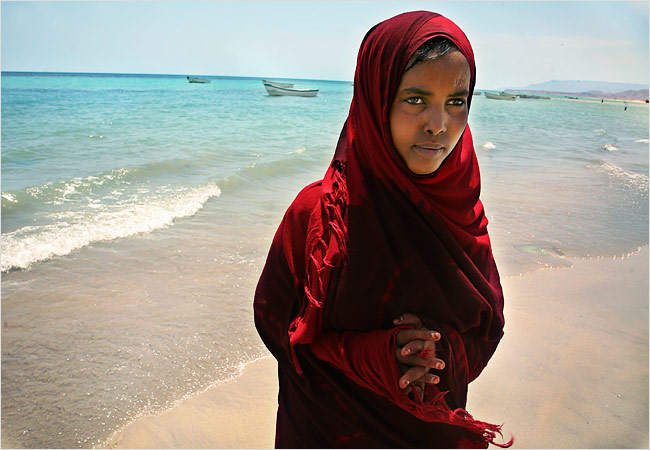Farhia Ahmed Muhammad, 17, was among 95 boat passengers forced by smugglers to jump overboard during a voyage from Somalia to Yemen.
Page 2 of 2
“It’s so dangerous, and there’s a real risk of being thrown in the sea,” said Batsieva Zerihum of the International Organization of Migration, who counsels the Ethiopian migrants gathered in Boosaaso to abandon their journey and head home.
“I talk to them, but everybody wants to try it. There are people who have tried four times and are trying it again.”
The first time Asho Ali Baree, 34, made the trip, the boat developed engine trouble, and the captain told the passengers to pray.
They did, and the boat somehow managed to find its way back to Somalia.
She was given another trip across, which made her luckier than another boatload of passengers who set off one night, only to be dropped down the Somali coast four days later and told that they had made it to Yemen.
“I was so mad,” said Adisu Sisai, 18, an Ethiopian, who lost $50 but has begun trying to earn enough to try again.
One of the more horrible tales emerged this year, when more than 100 people died at sea after the crew forced them out of the boat midjourney. A 10-year-old boy named Badesa was kept aboard to clean the ship on its return to Boosaaso. He is recovering from starvation and shock in the hospital. His abductors remain at large.
It is an open secret that powerful people in Puntland, including some with links to top politicians, own many of the boats engaged in the trafficking, but they do not seem to be pursued by the authorities.
Somalis who reach Yemen are entitled to benefits at a refugee camp there. But that is nobody’s goal.
The point is to get a highly paid job, anything above $50 a month in this part of the world, and for that they risk their lives.
Many find themselves deported, often to a landing strip outside Mogadishu, far from the villages where they began their treks.
Another danger lingers along the Somali coast. The police, though largely ineffectual in stopping the smuggling, sometimes arrest the migrants, though the legal basis for doing so remains unclear.
On a recent day, the police chief, Col. Muhammad Rashid Jama, paraded three men and one woman onto the grounds of the police station. All confessed that they had tried to get to Yemen.
One man, Abdi Ahmed Muhammad, 28, had a bandage on the side of his head, where he said a smuggler had bashed him with a rifle butt. The smuggler had taken his money but then refused to allow him onto the departing boat, he said.
The woman, Amal Hussein Ali, 37, said she had left seven children in Mogadishu as she went in search of a job in Yemen to support them. A widow, she faced up to three years in jail, the police said.
“Anyone who has a heart will feel pity for her,” Colonel Jama said. “I’m like that. But she became a criminal, and I am a Puntland officer safeguarding the Constitution.”
When United Nations officials protested to the Puntland authorities about the detention of the migrants instead of the smugglers, officials altered their account. The detained people, including Ms. Ali, were smugglers, they said.
Crackdowns have put some boats out of commission. But officials say they are hampered by the fact that no explicit local law prohibits trafficking.
So the flow continues, fueled by desperation mixed with greed. Mr. Mahmoud, nursing his wounded foot and haunted by so many years of living a nightmare, said he felt drawn to another, quieter place across the sea.
“When I look at the sea, in my mind, I think about going away from all this,” he said. “I just hope I make it.”






